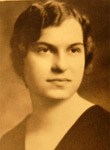Gift from 1930s chemist provides insight into plight of women scientists
By Gwen Glazer

A library supporter from the past is providing for the future: Erna Gramse, Master of Philosophy '33, a longtime librarian and a graduate chemistry student at Cornell during the Great Depression and died in 2007, has bequeathed a substantial gift to the Clark Physical Sciences Library (PSL).
Half the gift allows the PSL to purchase online databases and back issues of electronic journals; the other half will be invested to provide ongoing funds to help the PSL transition to its virtual presence, launching this spring.
"This wonderfully generous gift came at the perfect time, as the library transitions into an electronic environment," said Leah Solla, coordinator of the PSL. "The fact that Erna Gramse would leave a sizable bequest to the chemistry library is a tribute to her appreciation of the importance of the library to research, and the gift is very moving to me personally. I wish I had known her."
Gramse's history provides a window into the lives of women scientists several decades ago. She received her master's degree in chemistry -- then a Master's of Philosophy -- at Cornell in 1933 and returned a year later to begin her doctoral work.
"In the 1930s, there just weren't many women around. Women would have had to be so courageous, overcome tremendous doubts and barriers," said Barbara Baird, chair of Cornell's chemistry and chemical biology department.
Baird, who finished her doctorate in chemistry at Cornell in 1979, noted that only three women finished their degrees in her year; now, of 196 graduate students enrolled in the department, 77 are women.
Gramse graduated from Mount Holyoke College in 1932. In a 1977 speech, reprinted in The Chemist magazine, Gramse noted that attending an all-women's school meant she "was not prepared for the rebuffs and the battles to be fought for advancement and recognition later on."
Although she had no regrets about her undergraduate education, she said, "It wasn't until I went to graduate school at Cornell and found myself the only female in all of my classes that I realized I had chosen a career in a man's field."
Admission documents show that Gramse enrolled in a doctoral program in chemistry in 1934; she took some courses but never finished.
"We can't know exactly why Gramse left Cornell when she did, but we can hazard a few guesses based on challenges for women in academia during that time," said University Archivist Elaine Engst. "Relatively few women did graduate work in the sciences, and their chances for academic appointments were limited."
Other documents in Gramse's file suggest tacit challenges for women, as well. Her recommendations from Mount Holyoke deem her "somewhat diffident," "pleasant," "inconspicuous," "reserved" and possessed of "the German thoroughness."
"You can imagine that maybe she was frustrated with her Ph.D. work and left to have a successful career in a different context," Baird speculated. "But you can still say, 'what if?' What else would she have done if things had been different?"
Gramse went on to work at Texaco and the FMC Corp., a chemical corporation where she served as a librarian and researcher. She had a history of giving at Cornell, but the recent bequest was by far her most significant gift.
Thanks to Gramse, scientists at Cornell will have expanded access to journals and up-to-date research -- the same kind of access that Gramse provided throughout her career as a corporate librarian.
Gwen Glazer is a staff writer at Cornell University Library. Photo courtesy of the Division of Rare and Manuscript Collections, Cornell University Library.
Media Contact
Get Cornell news delivered right to your inbox.
Subscribe